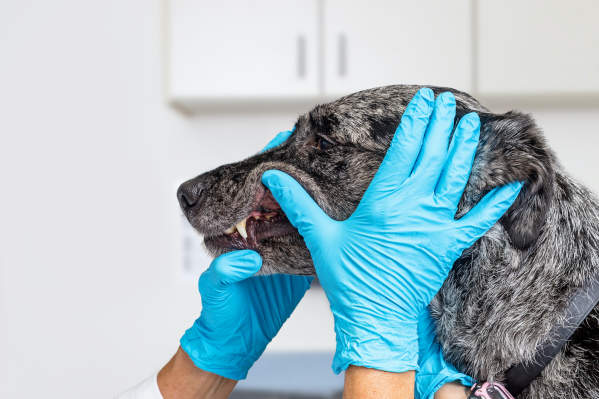Despite its overwhelming impact on your pet's overall health, pets' dental hygiene is often neglected in both dogs and cats. Periodontal disease can have devastating effects on the liver, heart, and kidneys. And while brushing teeth remains the number one way to prevent gum disease, it isn't always easy to do or effective enough on its own. Enter: dental chews. Dental chews are a fun treat meant to clean teeth and freshen breath - and my dogs are obsessed with one in particular that looks like a green toothbrush (you probably know the one I’m talking about!).
They love it so much that these dental chews are often used to lure them away from a room they shouldn’t be in, or an item they shouldn’t be touching. It makes them happy and causes them to behave, but does it actually work for its intended purposes? We asked the experts.
Dental treats and chews can and often will help keep plaque away and cut back on tartar buildup. "They work by scraping the teeth as the dog chews on them,” explains Dr. Gary Richter.
As with any other product out there, it depends on what you buy. Dental treats and chews can and often will help keep plaque away and cut back on tartar buildup. There are various products sold for dogs to chew on in order to help keep their teeth clean. “They work by scraping the teeth as the dog chews on them,” explains Gary Richter, DVM, medical director of holistic veterinary care and founder of Ultimate Pet Nutrition. To our furbabies, these dental chews are like candy, but it turns out they actually have some great hygiene benefits.
Of course, some work better than others and many do help to varying degrees, but that doesn’t mean they can completely replace a dental visit for a proper cleaning as well as tooth brushing at home, which remains the gold standard. “Even the best dental chews will not take the place of tooth brushing,” says Dr. Richter. Same as humans: We can and floss and brush twice a day (and should!) but we will still need those cleanings.
Still, these dental chews have many benefits that pets and their human parents love. Many dogs like to chew and frequently the products are flavored in a way that dogs enjoy. “The benefits are (hopefully) healthier teeth and gums,” says Dr. Richter. In fact: “Dental chews are proven to be effective in reducing the amount of oral bacteria in dogs by 60-70%,” says Claudine Sievert, a registered veterinary doctor and veterinary consultant.
Of course, as with any treat, there are some risks to keep in mind. “Risks include the possibility that the dog gets an upset stomach from eating the product and/or they swallow a large piece, which could potentially lead to a GI obstruction (rare),” says Dr. Richter.
Additionally, many dental chew products contain a lot of artificial ingredients, which would be better avoided for general health reasons. “This is not necessarily specific to dental chew products, but overall, artificial ingredients/ chemicals are best to avoid (just as they are with us),” says Dr. Richter.
Pet dental visits are expensive and time consuming — and a little scary for owners and their pets, so taking care of our pets’ teeth at home can make those outside visits more infrequent.
Pet dental visits are expensive and time consuming — and a little scary for owners and their pets, so taking care of our pets’ teeth at home can make those outside visits more infrequent. This is also something to keep in mind while we’re all under quarantine and trying to avoid trips out for the foreseeable future. “Chewing a specialized toy or a rawhide treat helps to mechanically remove the plaque and tartar,” says Dr. Sievert. This helps to prevent periodontitis, bad breath, bleeding gums, and dental pain in dogs.
Still, proceed with caution when shopping for anything your pet will put in their mouth. Try avoiding nylabones and animal bones. “We had dozens of dogs at our clinic with fractured teeth because of chewing the bones,” warns Dr. Sievert, whose suggestion is using the soft dental sticks because they are safer and equally effective.
